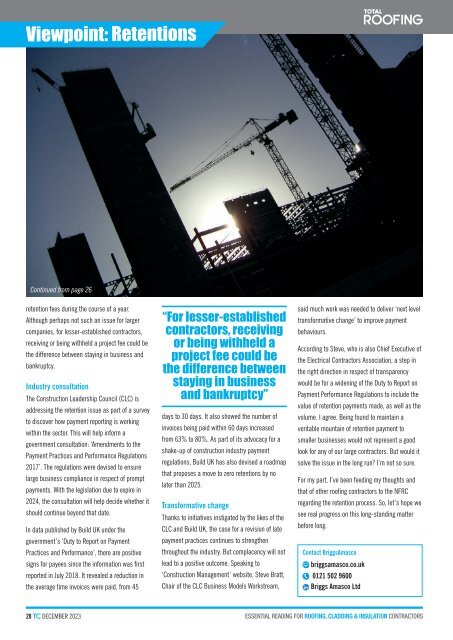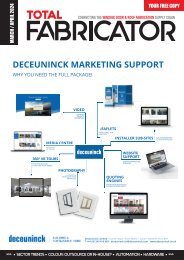December 2023
You also want an ePaper? Increase the reach of your titles
YUMPU automatically turns print PDFs into web optimized ePapers that Google loves.
Viewpoint: Retentions<br />
Continued from page 26<br />
retention fees during the course of a year.<br />
Although perhaps not such an issue for larger<br />
companies, for lesser-established contractors,<br />
receiving or being withheld a project fee could be<br />
the difference between staying in business and<br />
bankruptcy.<br />
Industry consultation<br />
The Construction Leadership Council (CLC) is<br />
addressing the retention issue as part of a survey<br />
to discover how payment reporting is working<br />
within the sector. This will help inform a<br />
government consultation: ‘Amendments to the<br />
Payment Practices and Performance Regulations<br />
2017’. The regulations were devised to ensure<br />
large business compliance in respect of prompt<br />
payments. With the legislation due to expire in<br />
2024, the consultation will help decide whether it<br />
should continue beyond that date.<br />
In data published by Build UK under the<br />
government’s ‘Duty to Report on Payment<br />
Practices and Performance’, there are positive<br />
signs for payees since the information was first<br />
reported in July 2018. It revealed a reduction in<br />
the average time invoices were paid, from 45<br />
“For lesser-established<br />
contractors, receiving<br />
or being withheld a<br />
project fee could be<br />
the difference between<br />
staying in business<br />
and bankruptcy”<br />
days to 30 days. It also showed the number of<br />
invoices being paid within 60 days increased<br />
from 63% to 80%. As part of its advocacy for a<br />
shake-up of construction industry payment<br />
regulations, Build UK has also devised a roadmap<br />
that proposes a move to zero retentions by no<br />
later than 2025.<br />
Transformative change<br />
Thanks to initiatives instigated by the likes of the<br />
CLC and Build UK, the case for a revision of late<br />
payment practices continues to strengthen<br />
throughout the industry. But complacency will not<br />
lead to a positive outcome. Speaking to<br />
‘Construction Management’ website, Steve Bratt,<br />
Chair of the CLC Business Models Workstream,<br />
said much work was needed to deliver ‘next level<br />
transformative change’ to improve payment<br />
behaviours.<br />
According to Steve, who is also Chief Executive of<br />
the Electrical Contractors Association, a step in<br />
the right direction in respect of transparency<br />
would be for a widening of the Duty to Report on<br />
Payment Performance Regulations to include the<br />
value of retention payments made, as well as the<br />
volume. I agree. Being found to maintain a<br />
veritable mountain of retention payment to<br />
smaller businesses would not represent a good<br />
look for any of our large contractors. But would it<br />
solve the issue in the long run? I’m not so sure.<br />
For my part, I’ve been feeding my thoughts and<br />
that of other roofing contractors to the NFRC<br />
regarding the retention process. So, let’s hope we<br />
see real progress on this long-standing matter<br />
before long.<br />
Contact BriggsAmasco<br />
briggsamasco.co.uk<br />
0121 502 9600<br />
Briggs Amasco Ltd<br />
28 TC DECEMBER <strong>2023</strong>

















